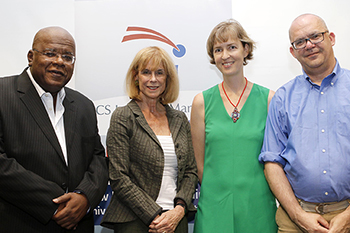Latest News Archive
Please select Category, Year, and then Month to display items
26 November 2020
|
Story Leonie Bolleurs
![]()
Mind Matters is a first for the UFS. It is a mental-health publication for students aimed at highlighting what matters most when it comes to your mind, life, and well-being. Some sections share how individuals in the top echelons of the UFS take care of their minds. Other sections focus on how to support your grey matter (i.e. your brain) and, consequently, improve your general functioning. Some parts discuss matters related to careers, well-being, finance, and self-development. We also provide news and resources that might matter to you.
Whatever your fancy, Mind Matters focuses primarily on why the health of your mind matters. Our minds and brains are the most powerful intelligence or apparatuses on the planet. A power like this needs to be wielded wisely, otherwise we may suffer much from our own neglect of our mental health. It’s not always easy, but it is important!
Mind Matters was possible due to the cumulative contributions, inputs, and work of numerous UFS professionals, especially within
Student Affairs. We are grateful and proud of each person involved. We endeavour to honour these efforts by continually improving and developing Mind Matters. Your feedback and voices are most welcome and will continue to inform what we do next.
UFS hosts first ACS Institute held on African soil
2015-12-08

The first ever Association for Cultural Studies (ACS) Institute hosted on the African continent is taking place on the Bloemfontein Campus. At the event are, from the left: Prof Jonathan Jansen, Vice-Chancellor and Rector of the UFS; Prof Jean Comaroff, Alfred North Whitehead Professor of African and African-American Studies and Anthropology at Harvard University; Prof Helene Strauss, Chair of the Department of English at the UFS; and Prof Gil Rodman, Chair of the Association for Cultural Studies and Professor of Communication Studies at the University of Minnesota.
Photo: Johan Roux
|
The University of the Free State (UFS) is hosting the 2015 conference of the Association for Cultural Studies (ACS) Institute – the first time for this international event to take place on the African continent.
From 7 – 12 December 2015, some of the world’s leading scholars in cultural studies are taking part in the conference on the Bloemfontein Campus. The event has been organised by the UFS Department of English in collaboration with colleagues from other departments in the Faculty of the Humanities.
The ACS is the foremost international association for scholars in cultural studies, and has been hosting the biennial Crossroads in Cultural Studies Conference since 2006. In 2011, the ACS held its inaugural institute at the University of Ghent (Belgium), followed, in 2013, by one at the Alpen-Adria University Klagenfurt (Austria). As the 2015 meeting of the institute is the first to be held in Africa, the organisers aim at highlighting the contributions that scholars from our continent and other (post)colonial contexts have made to cultural studies, even as it engaged many of the long-standing theoretical concerns generated for the field by scholars from the Global North.
Themed ‘Precarious Futures’, the conference explores how cultural studies might assist in charting more equitable futures by reflecting critically on the cultural, economic, and political trajectories within which precariousness – a state increasingly anticipated for the planet – might be altered. Experts in a diversity of disciplines are sharing their perspectives in the form of seminars and lectures.
Keynote lectures are delivered by Prof Jean Comaroff (Harvard University), Prof John Erni (Hong Kong Baptist University), Dr Jo Littler (City University London), Dr Zethu Matebeni (University of Cape Town), and Prof Handel Kashope Wright (University of British Columbia).
In her opening lecture on Monday 7 December 2015, Prof Comaroff addressed the challenging relationship of law, detection, and sovereignty in contemporary African polities within the South African post-apartheid context.
Topics discussed include climate change; the archives of everyday life; cross-racial intimacies; ethnography; meritocracy; cultural studies and human rights; China and globalisation; gender, sexuality, and race; and governance, embodiment and the work of care.